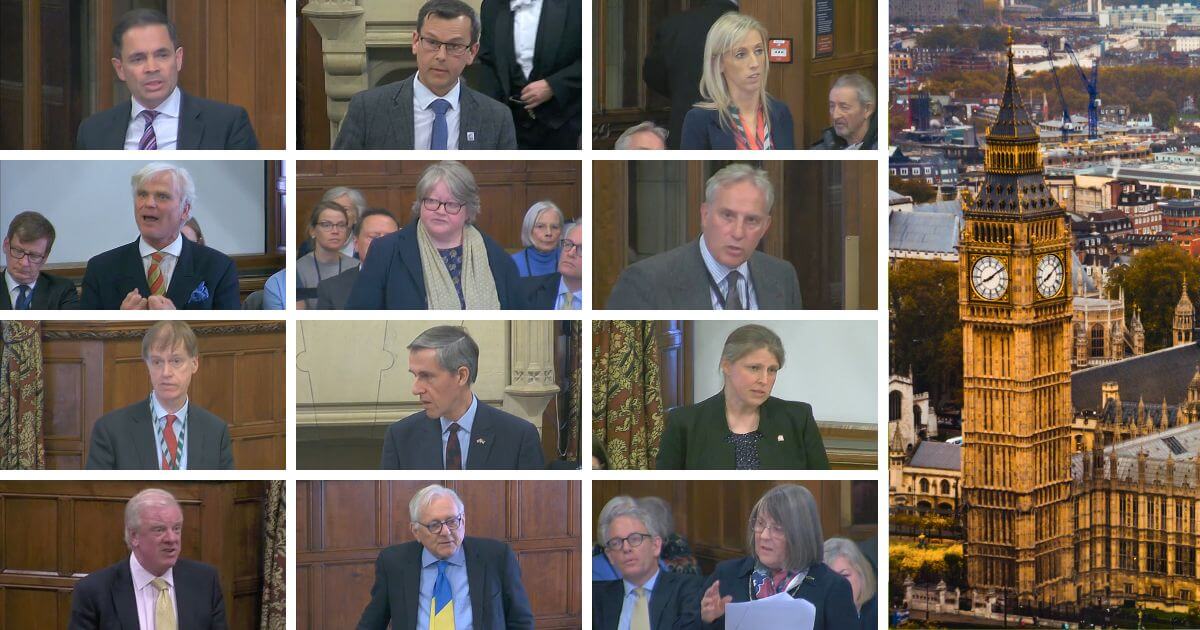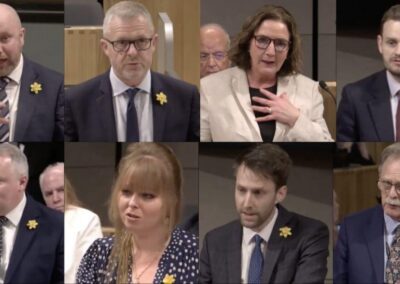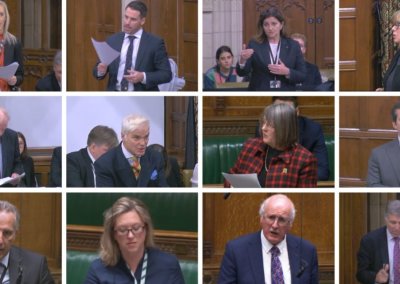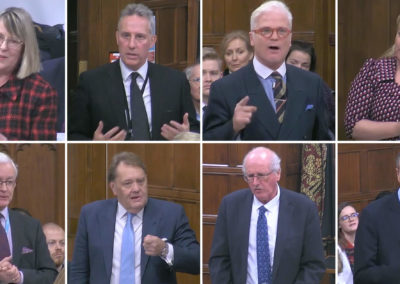A large number of MPs spoke in opposition to assisted suicide after an e-petition requesting a debate on the matter reached more than 100,000 signatures.
Having responded to the petition first through a written statement in which the Government stated assisted suicide was a matter for Parliament to decide, MPs were subsequently required to have a debate on the matter.
MPs opposed to a future change in the law on assisted suicide emphasised the manner in which the eligibility criteria for assisted suicide in other jurisdictions has rapidly expanded, the risks this legislation imposes on the most vulnerable, and the distortion of the doctor-patient relationship created by assisted suicide, among other concerns.
Expansion of assisted suicide in other jurisdictions
A number of MPs discussed the likely expansion of a possible assisted suicide law as has happened in other jurisdictions such as Canada, the Netherlands and Belgium, where child euthanasia is now legal.
Pointing to the experience of Canada in particular, DUP MP Ian Paisley said “It was said in 2016 that its legislation would have a very narrow scope, but that narrow scope has turned into discussions about disability, sick children and chronic mental illness. Those are all now within the purview of the Canadian law, but of course they were never supposed to be”.
Fellow DUP MP, Carla Lockhart added that “[t]he consequences of introducing assisted suicide are not a matter for speculation. The practice has been implemented in other countries not unlike ours, and when assisted suicide is permitted, it is a slippery slope”.
“Whenever assisted suicide has been legalised, however tight the initial safeguards and however sincere the assurances that it will be a narrowly defined law for rare cases, the practice has rapidly expanded”.
Conservative MP Nick Fletcher described the idea that assisted suicide could be tightly controlled once made legal as “naive”.
Being a burden and the dangers of coercion
Concerns about vulnerable people perceiving themselves as a burden or being perceived by others as a burden were a persistent refrain in the discussion. Rachael Maskell MP said she was concerned about “the person who says, ‘I’m just getting in the way. My children will have a better future without me. Perhaps the savings I have put aside could be better spent by them than on me’.”
“We have much to address, including the physical, psychological and spiritual needs of people in our country, and that must be our first consideration”.
Fellow Labour MP Sir Stephen Timms added “It seems to me that legalising assisted dying would impose a terrible dilemma on frail people, elderly people and others when they are at the most vulnerable point in their lives, especially on conscientious frail people who do not want to die but do not want to be a burden. I do not think that there is any way to avoid imposing that dilemma”.
Conservative MPs Sir Desmond Swayne and Thérèse Coffey also drew attention to the fact that not only can people experience themselves as a burden, with Swayne citing data about the high proportion of people who ended their lives in Oregon “who say they wanted it because they did not want to be a burden”, but also, as Coffey explained, that others can view vulnerable people as a burden.
“There has been a lot of discussion today about elderly people, but we are not just talking about elderly people. We are talking about vulnerable people. We are talking about people with disability. We are talking about people who could be taken advantage of to end their lives early and who may have that element of being considered a burden”, she said.
Paisley added his concerns about the potential for coercion in assisted suicide.
“We have all read the stories, seen the court reports and heard from our constituents about coercive and abusive control of females in our society: ‘I hate you’; ‘You’re not worthy of my love’; ‘Your children hate you’; ‘Are you still alive?’. We know what that does to people and what it drives them to do. It controls them and creates a very ugly environment for them to live in. That type of abuse is all too prevalent in our society. The elderly are similarly abused: ‘Mum had a good life, you know’; ‘You know, they’re done, really’; ‘It’s going to be very costly to keep them in this health service’. All that pressure builds”.
Confusion about the meaning of assisted suicide
Other MPs noted the confusion surrounding the terms of this debate, with Conservative MP Danny Kruger describing the term “assisted dying” as a “euphemism”.
“When the details of the proposed law change are explained to people, a majority of people oppose a change in the law. Crucially and most importantly, the doctors who work with the dying—people in palliative care and geriatric care, and GPs—overwhelmingly oppose a change in the law, because they know what we are talking about”, he added.
Fiona Bruce MP drew attention to 2021 polling, which found that “only four in 10 correctly understood [assisted dying] to mean providing lethal drugs to those with less than six months to live to end their life. The same proportion incorrectly thought that it meant giving people who are dying the right to stop life-prolonging treatment, which is already legal in the UK”.
“Worryingly, one in 10 said that the term referred to the provision of hospice-type care for people who are dying. So six in 10 people did not understand what “assisted dying” actually means”.
Both Sir Edward Leigh and Thérèse Coffey pointed out that a clear distinction should be made between giving someone pain relief that may shorten their lives and, as Coffey expressed it, “mindfully setting out to kill”.
Assisted suicide will fundamentally alter the doctor-patient relationship
Labour MPs Rachael Maskell and Sir Stephen Timms argued that making assisted suicide legal would constitute a “fundamental change” in the relationship “between the physician and the patient” and the national health service “so that it ends people’s lives as well as sustains them”.
DUP MP Jim Shannon also agreed saying that making assisted suicide legal “would fundamentally and irreversibly change the relationship between doctors and patients” and suggested it would violate the Hippocratic oath.
Devaluing human life
Andrew Selous MP said he was “deeply shocked” by an article from columnist and former MP Matthew Parris “who said in an article recently that he welcomes this being the thin end of the wedge, that he makes no apology for treating human beings as “units”, and that we should be making the cold calculus of inputs and outputs. I am appalled by that. I hope that every Member here is appalled by that type of discussion about our frail and elderly fellow citizens, who have a right to dignity and care until the very end of their lives. I will certainly fight back against that idea, and I want to call out what he said today in this debate”.
An increase in suicides
Sir Peter Bottomley MP and Danny Kruger MP both emphasised that assisted suicide is suicide and that making it legal will lead to a general increase in suicides.
Sir Peter said “There are about 5,000 to 6,000 suicides a year in this country. Do people think we are talking about 100 people a year extra or 1,000? I put it to the people here that if we had a Dutch level of medical assistance in death, we would add 15,000 deaths a year—we would treble the number of existing suicides and, including the existing figure, take it up to four times”.
Danny Kruger said that in countries in which assisted suicide is made legal, suicide goes up among the general population. “The fact is that suicide is contagious”, he said.
“Suicides among people who would not be eligible for assisted suicide increase in countries that have legalised it. I am afraid that is understandable when we consider that the Government have told society that some people would be better off dead. We have policies in this country to prevent suicide—we want to stop people committing suicide. It is important that we recognise the potential implication of a change in the law for others”.
While there is an assisted suicide bill under discussion in the Scottish Parliament at this time, there is no similar legislation for England and Wales.
Spokesperson for Right To Life UK, Catherine Robinson, said “It is encouraging to see such a large number of MPs speaking out in opposition to assisted suicide”.
“The debate on assisted suicide appears to be a policy area in which there is a genuine debate and sincere change of mind. Labour’s Shadow Minister for Disabilities Vicky Foxcroft, who voted in favour of assisted suicide in 2015, has since changed her mind and now opposes the practice due to concerns raised by people with disabilities who fear they will be adversely affected by a change in legislation”.
“This particular debate is largely symbolic but is an opportunity for MPs and the public to learn from the mistakes of other jurisdictions such as Canada, where safeguards are rapidly being eroded including the removal of the requirement that a person be terminally ill to be eligible for an ‘assisted death’ and the planned expansion of ‘assisted dying’ on the grounds of mental illness alone from 2027”.
“Furthermore, the recent case of a Dutch woman who was granted and planned her own death due to her mental health struggles is a real wake-up call to our legislators who should recognise how assisted suicide legislation can become a form of state-approved death in response to despair”.
“Every debate on assisted suicide is a chance to show where this legislation almost inevitably leads. Instead of assistance in death, people experiencing suicidal ideation need comfort, support and love to alleviate the suffering as far as possible, not the offer of death”.












